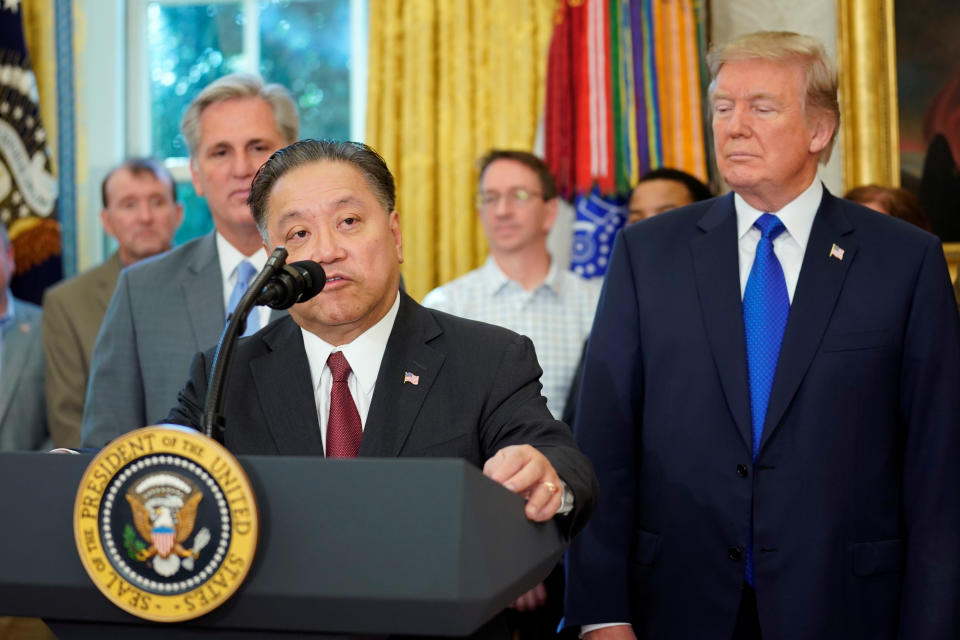Antitrust expert calls Broadcom's bid for Qualcomm 'pretty audacious'
Chip maker Broadcom (AVGO) is gearing up for a hostile takeover battle for its competitor Qualcomm (QCOM), in a move one antitrust expert said “seems pretty audacious” in light of recent legal issues.
In recent months, Qualcomm has been fighting litigation with Apple (AAPL) on multiple fronts, as well as an antitrust lawsuit from the FTC. Both the FTC and Apple accuse Qualcomm of exploiting its dominant position over certain semiconductors to hit cellphone makers with outrageous patent royalties and to stifle competition.

“Admittedly, trying to buy Qualcomm right now seems pretty audacious,” said Christopher Sagers, a professor at Cleveland-Marshall College of Law and an expert on antitrust law.
A bid to acquire a firm already under antitrust scrutiny
Sagers added: “It’s bad enough that Broadcom is trying to acquire a firm in what at least superficially looks like a big, horizontal merger [a merger between competitors] while the target firm is itself actively defending accusations that it is already monopolizing similar products.”
The agency leveling those accusations against Qualcomm, the FTC, is likely the same one that will review Broadcom’s bid to take the company over since it typically does merger review in chip-maker deals, according to Sagers.
“Basically, two teams of lawyers within FTC, who are friends and work together, will on the one hand be waging courtroom war insisting that Qualcomm is a menace,” Sagers said, “and on the other hand be required to keep an open mind about whether that same firm can combine with a big horizontal competitor.”
Despite Broadcom’s purported audacity, Sagers said he does not believe this is the kind of merger that the FTC would block outright — nor does Sagers believe the FTC suit must be resolved before a deal can go through. A few things will need to happen before this deal comes to fruition, though.
An unfriendly deal has to turn into a friendly one
Broadcom’s $103 billion bid for Qualcomm was an unsolicited offer, and it’s one that the latter company plans to fend off on the grounds that it undervalues the company. Qualcomm will argue to shareholders that a deal will likely face scrutiny from regulators and could lead to a fight with the company’s board, people familiar with the matter told Bloomberg.
If this remains a hostile deal, then Qualcomm — like any unwilling target — would be likely to whisper into regulators’ ears about why the deal would be anticompetitive, according to George Hay, a professor at Cornell Law School and a leading antitrust expert.
“It’s very, very difficult to succeed with a hostile takeover,” he said.
So, how does one company turn its hostile takeover target into a willing one?
“Most of the time there’s an amount of money which will turn it into a friendly deal,” Hay told Yahoo Finance. “There’s certainly an amount of money which will make Qualcomm willing to be taken over.”
Whether that’s an amount of money that Broadcom is willing to pay is another matter. Assuming Broadcom does warm relations with Qualcomm, the two competitors may need to agree to some concessions to get the FTC to sign off on the deal.
Specifically, regulators may try to identify areas where the two companies overlap. If they each have a big enough share in those areas, then regulators may require them to divest those parts of the business before a deal can go through, explained Herb Hovenkamp, another antitrust expert and a professor at the University of Iowa College of Law.
In the meantime, Broadcom is wasting no time cozying up to the White House. Just last week, President Donald Trump announced that the Singapore-based company was relocating its home address to the U.S. As Sagers noted, the Qualcomm deal was surely in the works at that point.
Erin Fuchs is deputy managing editor at Yahoo Finance.
Read more:
Why it’s a ‘big surprise’ that Trump’s DOJ may fight AT&T’s Time Warner deal
Harvey Weinstein scandal could expose a ‘murky, untested’ area of the law
Why somebody like the KB Home CEO would get to keep their job after a profane outburst
How America’s tech giants reached crisis mode
Moody’s: Amazon may actually be the weakest retailer
Here’s what the fired ‘anti-diversity’ engineer would have to prove in his case against Google
A fight over gay employees will almost certainly hit the Supreme Court
A legal fight over NYC dog sitters highlights a bigger problem in America
